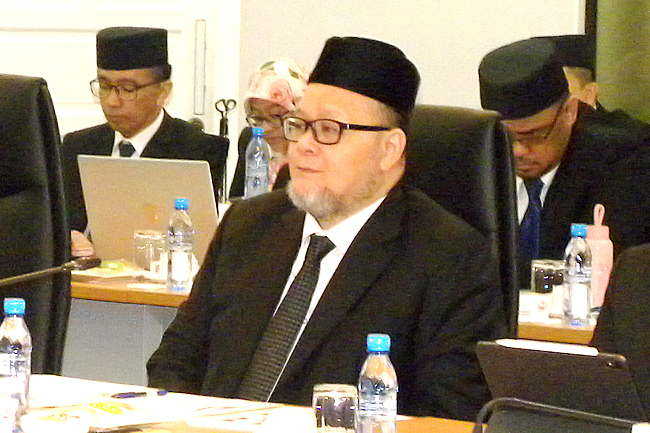Azlan Othman
The Ministry of Education (MoE) is simultaneously developing a digital literacy standard to provide the latest and relevant curriculum to deliver competency and skills required for 21st Century students, and Entrepreneurship Innovation Centre (EIC) to enhance entrepreneurial skills and innovation among students, said Minister of Education Dato Seri Setia Awang Haji Hamzah bin Haji Sulaiman.
During a dialogue with Legislative Council (LegCo) members at the MoE yesterday.
He said the ministry is also focussing on the development of teachers’ capacity to cope with the shift to digital teaching.
The minister said, “Through the Brunei Darussalam Leaders and Teachers Academy (BDLTA), several professional development initiatives, such as the Technology Enhanced Learning Environment (TELE), have been introduced to increase teachers’ digital readiness, mainly on teachers’ ability to teach online and the delivery of 21st Century curriculum. The Teachers’ Lounge and the School Leaders’ Lounge, virtual platform for teachers and school leaders to share and access the latest initiatives, digital resources and best practices in education were introduced in 2020.”
All these initiatives are in line with one of the strategic objectives in the MoE’s Strategic Plan 2018-2022, which is to transform its human resource into a performance-driven culture.
Speaking on teaching and learning during the pandemic, the minister shared some initiatives to mitigate the impact of COVID-19 in education.

These include the implementation of the business continuity plan (BCP) for schools and the MoE, the supply of sanitising products and equipment to public schools, provision of home based learning (HBL) through online platforms as well as the home learning pack (HLP) and educational television programmes in collaboration with Radio Television Brunei (RTB).
Various initiatives were also taken to address technological needs of students done by working closely with the Ministry of Transport and Infocommunications (MTIC), Authority for Info-Communications Technology Industry of Brunei Darussalam (AITI) and private telecommunications companies in providing devices and access to the Internet, especially among underprivileged students, the minister said.
The MoE established the Educational Technology Centre (EDTech) to support the use of technology in teaching and learning, in an effort to produce digitally literate students.
Dato Seri Setia Awang Haji Hamzah also shared that facility management introduced at the ministry in 2019, has now been extended to all primary, secondary and sixth form centres as well as other offices in the four districts to ensure smooth, conducive and safe teaching and learning environment.
The implementation of the project has also become one of the main ways to support the Fiscal Consolidation Programme under the Ministry of Finance and Economy given the potential savings compared to conventional contracts, he said.
One of the strategic initiatives in supporting the formation of a knowledge-based society to realise Brunei Vision 2035 is the implementation of a Lifelong Learning Centre (L3C). The centre serves as a one-stop information hub for lifelong learning programmes and activities from various training providers with cooperation with various stakeholders.
The minister also highlighted some of the outstanding achievements of public higher education institutions, such as close collaboration with key stakeholders such as the Manpower Planning and Employment Council (MPEC) to ensure that the programmes offered are competitive and demand-driven in producing highly employable graduates.
The dialogue is an annual event of the Department of the Councils of State at the Prime Minister’s Office with the relevant ministries and agencies.
Sixteen LegCo members, led by Yang Berhormat Pehin Orang Kaya Putera Maharaja Dato Paduka Haji Abdul Ghani bin Pehin Datu Pekerma Dewa Dato Paduka Haji Abdul Rahim, attended the session yesterday.
Deputy Minister of Education Datin Seri Paduka Dr Hajah Romaizah binti Haji Mohd Salleh, permanent secretaries, vice chancellors, rector, deputy permanent secretaries, acting director general of education, heads of departments and senior officers at the MoE were also present.